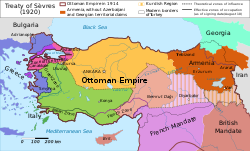
Back حكومة الجمعية الوطنية الكبرى Arabic Türkiyə Böyük Millət Məclisi hökuməti Azerbaijani آنکارا حوکومتی AZB Ankararegeringen Danish Κυβέρνηση της Μεγάλης Εθνοσυνέλευσης Greek Gobierno de la Gran Asamblea Nacional Spanish دولت ملی مجلس بزرگ Persian Gouvernement de la Grande Assemblée nationale French Pemerintah Majelis Nasional Agung ID Governo della Grande assemblea nazionale turca Italian
State of Turkey Türkiye Devleti | |||||||||||||||||
|---|---|---|---|---|---|---|---|---|---|---|---|---|---|---|---|---|---|
| 1920–1923 | |||||||||||||||||
| Motto: Hâkimiyet bilâ kaydü şart milletindir "Sovereignty unconditionally belongs to the nation" | |||||||||||||||||
| Anthem: İstiklal Marşı "Independence March" | |||||||||||||||||
 De Jure Situation in the Ottoman Empire following the Treaty of Sèvres. | |||||||||||||||||
| Capital | Ankara (de facto) | ||||||||||||||||
| Official languages | Turkish[1] | ||||||||||||||||
| Religion | Islam (official)[1] | ||||||||||||||||
| Government | Provisional government under a parliamentary republic | ||||||||||||||||
| Speaker | |||||||||||||||||
• 1920–1923 | Mustafa Kemalab | ||||||||||||||||
| Caliph | |||||||||||||||||
• 1922–1923 | Abdülmecid II | ||||||||||||||||
| Prime Minister | |||||||||||||||||
• 1920–1921 | Mustafa Kemal | ||||||||||||||||
• 1921–1922 | Mustafa Fevzi | ||||||||||||||||
• 1922–1923 | Hüseyin Rauf | ||||||||||||||||
• 1923 | Ali Fethi | ||||||||||||||||
| Legislature | Grand National Assembly | ||||||||||||||||
| Historical era | War of Independence | ||||||||||||||||
| 23 April 1920 | |||||||||||||||||
| 3 May 1920 | |||||||||||||||||
| 20 January 1921 | |||||||||||||||||
| 11 October 1922 | |||||||||||||||||
| 1 November 1922 | |||||||||||||||||
| 24 July 1923 | |||||||||||||||||
| 29 October 1923 | |||||||||||||||||
| Population | |||||||||||||||||
• | 6–7 million[2] | ||||||||||||||||
| Currency | Ottoman lira | ||||||||||||||||
| |||||||||||||||||
| Today part of | Turkey | ||||||||||||||||
The Government of the Grand National Assembly (Turkish: Büyük Millet Meclisi Hükûmeti), self-identified as the State of Turkey (Türkiye Devleti) or Turkey (Türkiye),[3] commonly known as the Ankara Government (Ankara Hükûmeti),[4][5][6][7][8][9] or archaically the Angora Government, was the provisional and revolutionary Turkish government based in Ankara (then known as Angora) during the Turkish War of Independence (1919–1923) and during the final years of the Ottoman Empire. It was led by the Turkish National Movement, as opposed to the crumbling Constantinople Government/Istanbul Government, which was led by the Ottoman Sultan.
During the War of Independence, the Government of the Grand National Assembly commanded the army known as Kuva-yi Milliye ("National Forces"). After the war and victory over the monarchist Constantinople Government, the republican Ankara Government declared the end of the Ottoman Empire and the creation of the Republic of Turkey from its ashes in 1923. The Grand National Assembly is today the parliamentary body of Turkey.
- ^ a b [1] TEŞKİLÂTI ESASİYE KANUNU
- ^ Belgelerle Türk tarihi dergisi, Edition 18, Menteş Kitabevi, 1986, page 72. (in Turkish)
- ^ Ryan Gingeras (2019). Eternal Dawn: Turkey in the Age of Atatürk. p. 86.
- ^ Esra Yakut: Şeyhülislâmlık: yenileşme döneminde devlet ve din, Kitap Yayınevi Ltd., 2005, ISBN 9789758704941, page 198,199. (in Turkish)
- ^ Pars Tuğlacı: Çağdaş Türkiye, Cem Yayınevi, 1987, Turkey page 358. (in Turkish)
- ^ Hakan Alan, Avni Alan: İstanbul Şehir Rehberi, ASBOOK, 2007, ISBN 9750114701, page 12. (in Turkish)
- ^ Yahya Kemal: Eğil Dağlar, Kubbealtı Publishing, 1966, ISBN 9757618519, pages 13, 92-93, 138, 155, 170, 188, 204-205, 232, 302, 338. (in Turkish)
- ^ William Hale: Turkish Foreign Policy, 1774-2000, Routledge, 2012, ISBN 0415599865, pages 36, 37, 38, 50, 265.
- ^ Kemal Kirişci, Gareth M. Winrow: The Kurdish Question and Turkey: An Example of a Trans-State Ethnic Conflict, Routledge, 1997, ISBN 0714647462, pages 71-75, 77-79, 80, 82-84.
